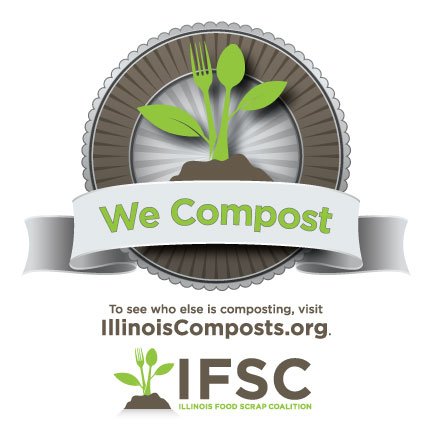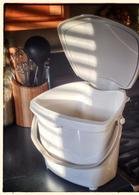Municipal Franchise Agreements: Making a Difference
It’s the holiday season and you might be expecting a blog post about green gifts. Here’s the post that I wrote last year. Not all of the ideas are applicable during a pandemic but I’m always going to suggest experiences over things.
If you have been in our composting community for a few years, you probably know that we entered into a franchise agreement with our hometown of Evanston in November 2017 and our neighbors in Skokie in January 2020, but have you heard that we’ve just added Morton Grove beginning December 2020?
You may be wondering what a municipal franchise agreement is and why you would want one. It doesn’t fit in a stocking, but yes, you do want one on your wishlist.
Municipal waste hauling franchise agreements benefit the municipality itself, the residents and businesses in that municipality, the waste hauler and in the case of food scrap hauling, everyone on the planet.
How this usually goes down is that the municipality puts out an RFP, which stands for request for proposal, several companies apply and the municipality picks one. The municipality usually gets some free service as part of the agreement. The municipality also benefits in that they are providing for their residents and therefore making their municipality a more attractive place to live.
The residents and businesses in that municipality benefit because generally there is a price reduction for the service that makes it more affordable for everyone.
The waste hauler benefits because generally, this means more concentrated business and the power of the marketing department of the municipality. An exclusive franchise agreement means that other food scrap hauling businesses are not allowed to service customers in that municipality.
It bears repeating that food scraps in landfills create methane, a greenhouse gas more potent than carbon dioxide, and that reducing it helps mitigate climate change. So, if I compost, it helps everyone, not just me. Kind of like wearing a mask during a pandemic. But, I digress.

If you read our August blog post on food waste bans, you learned what a yard waste tagalong is. Many municipalities have adopted these as their only composting option. Because I’m generally a positive person, I want to say that these are a good start, but what I really think is they are just a start. They provide service for almost exclusively single-family homeowners because they are the ones with yard carts. That’s not everyone. It’s not even close to everyone. The programs are usually only eight months of the year. That’s only two-thirds of the year. One of the hardest things to do is create a new habit. With a tagalong, you get into the habit of separating out your food scraps and then the program ends and doesn’t begin again for four months! These programs make no provision for residents in multi-unit dwellings nor for other non-residents like businesses and faith communities. A container-swap program works well for them.
Our franchise agreements offer year-round service for all properties using a container-swap model. We provide either 5-gallon buckets or 32-gallon Neighbor Totes and swap out the full container with a clean, empty container every time.
We offer something we call a Winter Gap Program in Evanston and Morton Grove to complement their yard cart programs. This is our creative solution for helping people who have gotten into the habit of composting for eight months to be able to continue. You make one upfront payment to use our container-swap program during those four months. You have the option to go back to using your yard cart or to stay with us for a year-round program.
How can I convince my municipality to provide a composting option?
Just like your representatives and senators, municipalities respond to pressure from their constituents. Before you begin putting on pressure, check your municipality’s website to know what composting options, if any, are already available. This can usually be found in the Public Works section or where they have information about other waste services. Even if there is a yard waste tagalong, based on what you’ve learned here, you can suggest that an agreement for a container-swap program be added.

The Illinois Food Scrap Coalition’s We Compost Recognition Program recognizes fifty-seven municipalities in Illinois that have composting programs. Knowing which municipalities that are similar in size or maybe even border yours can be very helpful in your communications with your own. Peer pressure works!
Perhaps your municipality has a Go Green Group. If you’re not sure, you can check here on Go Green Illinois’s Member Directory to see and to find contact information. If there is a sustainability task force or an environmental board or group in your municipality, it’s possible that they have already begun this conversation. Check in with them and see if you can work together. It works best if there are a lot of you asking at the same time.
If you live in the City of Chicago, we’re happy to work out an agreement through your alderman or neighborhood group. See if they have a sustainability group that you could work with and let us know that you’re interested in pursuing this. We may be able to connect you with others in your area in order for you to work together. You’d use the same general method of making it happen that we’ve laid out above.
The waste industry is so weird. We’d understand if you were bewildered by it too. Here are some questions we have.
- Why is landfilling so cheap when it’s so bad for the planet?
- When did they start covering up trash at landfills with plastic?
- Why aren’t manufacturers responsible for the waste they create?
- Why is it always the end-user who is responsible?
- Why do so many municipalities offer an 8-month yard waste cart food-scrap tagalong and stop there when so many of their residents live in multi-unit buildings and don’t have yard carts?
- Why are we encouraged to buy things like garbage bags that just get thrown out?
We’re working on making it better. The more people who compost, the less we’ll be sending to landfills.
Give the gift of composting!
Do any of these sound like the people on your gift list?
- Concerned about climate change but not sure what to do about it.
- Compost in their backyard but don’t add much to it in the winter since it breaks down slower or don’t like the cold so they don’t want to walk all the way out to their bin.
- Have been meaning to set up a compost bin in their backyard but haven’t quite gotten to it yet.
- Have everything they need, except a composting service.

Our top-notch customer service team can help you with a gift certificate for as many weeks, months or years of service that you want to give.
If you absolutely need to give a thing with the gift certificate, consider purchasing a countertop compost collection container. We sell the one pictured here. It could be delivered to you or delivered with the first bucket to your giftee.
This winter is going to be different. There’s no getting around that. How can we turn different into making a difference?